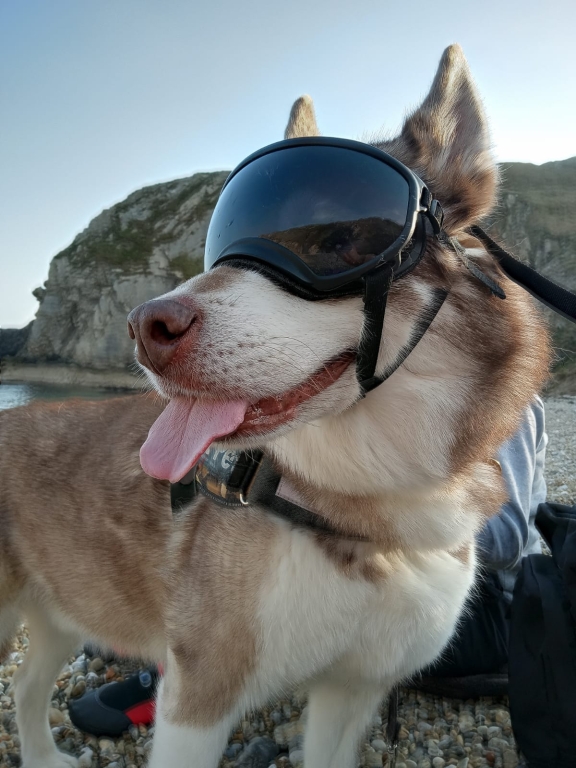
Six-year-old Siberian Husky/Malamute crossbreed, Duke sporting his sunglasses
A Bright Future Ahead For Dogs With Sunglasses
An award-winning Wiltshire veterinary hospital is advising that dogs who need protection from bright light are fitted with specially-designed pet sunglasses.
Eastcott Veterinary Referrals in Swindon, Wiltshire, is helping troubled dogs beat the blinding glare by recommending visors and sunglasses which have been specifically designed for animals.
Ida Gilbert, head of ophthalmology at Eastcott, says tinted glasses are a quick and practical solution for several painful and worrying conditions and, although they come in many distinctive designs, should not be viewed as fashion accessories.
Ida said: “Sunglasses for dogs may seem peculiar but it is a viable solution to help pets in situations where their eyes need protection or may need that extra bit of support because of surgery or a previous trauma.
“There are certain conditions in dogs which worsen from exposure to UV light such as pannus, an immune-mediated condition affecting the cornea or clear part of a dog’s eye.
“Dogs with such conditions may be able to reduce the need for topical medications if sunglasses or a visor is worn. However, it is important they have a thorough examination and a proper diagnosis before trying them out.
“Some animals with reduced vision can benefit from improved confidence as they can sense their surroundings better through the visor, whilst others may find it easier to eat and drink than when they wear a more traditional buster collar after surgery.
“Used alongside surgical treatments for eye conditions, the addition of glasses and visors is part of the patient’s wider care plan. It may not be an option for everyone, as the dog will need some training, but it is an alternative and appropriate solution for many and a good aid to recovery.”
The shades have certainly gone down well with pet owners, who say they have been beneficial and helped their dogs whilst recovering from eye surgery, for instance, rather than wearing a larger buster collar.
Amy Wilson, from Shaftesbury in Dorset, said Duke, her six-year-old Siberian Husky/Malamute crossbreed, had suffered with cataracts and other eye conditions since he was just 18 months old and has already had his right eye removed.
She said: “It’s vitally important to protect Duke’s left eye, so when Ida recommended RexSpecs I thought ‘Whatever you say, you are the expert!’
“At first, though, Duke did not want to wear them and tried everything to get them off, including rubbing against my leg, the sofa, the floor and shaking his head.
“Now he is much more accepting and has two pairs – a tinted pair for sunny days and when he goes to the beach and a clear pair to protect his eye on more shady days.
“I’ve had plenty of comments from passers-by such as ‘why’s your dog wearing sunglasses?’ and ‘oh, your dog’s wearing ski goggles!’. I would certainly recommend them to other dog owners whose pets have serious eye problems.”
Eastcott offers specialist expert care in cardiology, dentistry, internal medicine, ophthalmology, oral and maxillofacial surgery, oncology, orthopaedics, soft tissue surgery, laparoscopy, neurology, diagnostic imaging, CT and MRI, anaesthesia and analgesia and emergency and critical care.
For more information, visit www.eastcottreferrals.co.uk or search for Eastcott Veterinary Referrals on social media.
More from Linnaeus Group
- Mars Veterinary Health publishes 2025 Science Impact Report highlighting global advances in pet health
- AMVS specialist gets to heart of puppy's problem
- Garston Veterinary Group team earn BVRA recognition
- Chihuahua Lola loving life after 'challenging' spinal surgery
- Vets save therapy cat's life following road accident

 4 years ago
4 years ago  1228 views
1228 views
